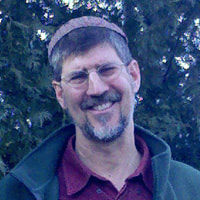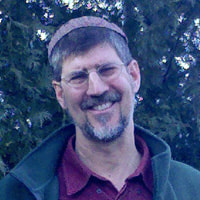The Spiritual Dynamics of Prayerby Rabbi Natan Margalit Ph.D.  One of the most important innovations of the Hasidim concerns distracting thoughts (mahshavot zarot) that come to mind when praying. Rather than trying to chase them away, one should “raise the sparks” by delving deeply into the distracting thought. This idea goes straight back to the founder of Hasidism, the Baal Shem Tov (founder of Hasidism, Rabbi Israel ben Eliezer, d. 1760), and there are some wonderful ways he expressed it. One of my favorites is his understanding of the Talmudic passage in TB Brakhot 33b: MISHNAH. IF ONE [IN PRAYING] SAYS ‘MAY THY MERCIES EXTEND TO A BIRD'S NEST’, ‘BE THY NAME MENTIONED FOR WELL-DOING’, OR ‘WE GIVE THANKS, WE GIVE THANKS’, HE IS SILENCED. . . Gemara. … R. Zera said: To say ‘Shema, Shema’, is like saying ‘We give thanks, we give thanks’. . . Said R. Papa to Abaye: But perhaps [he does this because] at first he was not attending to what he said and the second time he does attend? — He replied: Can one behave familiarly with Heaven? If he did not recite with attention at first, we hit him with a smith's hammer until he does attend. Let's briefly unpack this Mishnah and its Gemara commentary. It seems likely that the Mishnah was concerned with dualistic ideas current at the time that limited God to only the good. One should not talk about God’s mercies for the mother bird, because it implies that God only acts with compassion. Rather, we shouldn’t leave God out of troubling events. “Be Thy name mentioned for well doing” similarly can be taken to imply well doing, but not everything else. “We give thanks, We give thanks” can be taken as addressed to two Divine beings, one in charge of the good events and one in charge of all the rest. However, in the Talmud’s commentary, Abaye’s answer to Rav Papa goes in another direction, and seems to imply that the problem with saying the Shema twice is not dualism, but being too familiar with God. It is not proper to stutter and repeat oneself in addressing God. Once is all the chance you get in the royal court of the Divine. The Baal Shem Tov, in his Amud HaTefillah (Sefer Baal Shem Tov, Vol. 1, pg. 151- 155), brings this Talmud text powerfully back to the question of God’s presence in all things. He raises an objection to Abaye’s answer, saying,
I find this practically useful in prayer. When I drift off during prayer, I am sometimes tempted to go back and do it again. But I also have another choice: I can look for a minute at my day dream and see if it is, in fact, a subject calling for my deep attention.
The Komarno Rebbe (Rabbi Yitzchak Eisik Yehuda Yechiel Safrin of Komarno, 1806 – 1874) in his book Heikhal HaBrakhah, writes that this idea is not just for the elite. When people push away stray thoughts, they are as if killing a complete and complex edifice. He then continues, “And, know, my brothers, that it is not only in the times of prayer and studying Torah that stray thoughts come in order to be repaired – rather, at all times and with all people ‘in the markets and in the streets I sought the beloved of my soul’ (Song of Songs 3:2) – to raise up the sparks which are sunken in the depth of the kelipah” (ibid. Sefer Ba’al Shem Tov. Vol. 1). Thinking of the way this comes up in everyday life, I was reminded of a book I read last year: The Power of Habit, by Charles Duhigg. In it he gives the latest psychological thinking about forming and breaking habits. Every habit has its reward – the treat at the end of the task. But the interesting thing is that we often don’t know what the real reward is until we pay close attention. Duhigg tells about his own experience of trying to lose weight. He made a habit of going to the water cooler in his office at 3:00 p.m. and eating cookies there. It seemed obvious that the cookies were his reward for going to the cooler. But when he really thought about it, he realized what he was drawn not by the cookies, but the chance to schmooze with his friends. That was his real reward. And sure enough, when he found other times to schmooze when cookies weren’t available, he lost weight. The hidden spark was his desire for human connection, for companionship, for recognition. If he were to meet a Hasidic Rebbe, I imagine the Rebbe might gently push him a step further to ask, when you are schmoozing with your friends, trading stories, bragging about achievements, complaining about work hours or taxes – what are you really looking for? Love, acceptance, belonging? Perhaps, there is something even deeper that you are looking for. In everything, there is a spark of holiness. © Copyright by Rabbi Mike Comins. You are welcome to reprint this article in your local newspaper, email list, Temple Bulletin or other communication if the following is appended: "This article is provided by the Making Prayer Real eJournal at RabbiMikeComins.com, where you will find outstanding resources on Jewish prayer." Rabbi Natan Margalit was raised in Honolulu, Hawaii, studied anthropology at Reed College in Portland, Oregon, made aliyah, and studied for many years in Israeli yeshivot. He received rabbinic ordination at The Jerusalem Seminary in 1990 and earned a Ph.D. in Talmud from U.C. Berkeley in 2001. He has held teaching positions at Bard College, the Recontructionist Rabbinical College and the Rabbinical School of Hebrew College in Boston. Rabbi Margalit is the founder of Organic Torah, an important and unique voice in the world of Jewish ideas. He has written and taught for many years on Judaism and the environment, innovative approaches to Jewish texts, Jewish spirituality, and gender and Judaism. He lives in Newton, Massachusetts with his wife Ilana and sons, Nadav and Eiden.
0 Comments
Prayer Talk VideoRabbi Natan Margalit
Rabbi Natan Margalit interprets Hasidic wisdom on how to respond to distraction and unwanted thoughts during prayer.

Natan Margalit was raised in Honolulu, Hawaii, studied Anthropology at Reed College in Portland, Oregon, made aliya, and studied for many years in Israeli yeshivot. He received rabbinic ordination at The Jerusalem Seminary in 1990 and earned a Ph.D. in Talmud from U.C. Berkeley in 2001. Natan blogs and teaches at Organic Torah (www.OrganicTorah.org), bringing together his interests in Jewish texts, the environment and paradigm shift. He lives in Newton, MA with his wife Ilana and sons, Nadav and Eiden.
|
Welcome to the Making Prayer Real eJournal! Edited by Rabbi Mike Comins and sponsored
by the Making Prayer Real Curriculum, the eJournal offers wisdom, tools, and resources on the art of Jewish prayer. Explore the eJournal by clicking on the topics below. Please share these resources with your friends!
Categories
All
|
 RSS Feed
RSS Feed